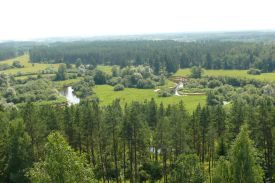EU – Baltic States, Forum, Latvia, Legislation, Markets and Companies
International Internet Magazine. Baltic States news & analytics
Friday, 26.04.2024, 10:06
Assessing the inclusion of agriculture and forestry in climate change policy in EU
 Print version
Print version |
|---|
AFOLU meetings, which are organised two or three times a year by the country holding the presidency of the EU Council, bring together EU Forestry and Agriculture Ministers. The aim of the Riga meeting was to prepare the EU Member States' position on the role of agriculture and forestry in the greenhouse gas (GHG) inventory and climate change, which is required for the process of international negotiations under the UN Framework Convention on Climate Change (UNFCCC).
At the meeting in Riga, experts worked on preparations for the session in Bonn on 1-11 June that will bring together all 194 UN Member States to approximate their opinions through international negotiations on actions to be taken to mitigate climate change. The meeting in Bonn will prepare for the Conference of the Parties (COP) to the UNFCCC to be held in Paris at the end of 2015, during which all 194 Member States will have to agree on a global climate agreement that will lay down post-2020 global climate commitments.
“These six months, when Latvia is holding the Presidency of the EU Council, are decisive in preparing for the very important climate conference in Paris. The results of the expert meeting, and whether the EU's position in the global forum is convincing and in line with the commitments of other countries, will depend on all our contributions and negotiating skills and will also make use of Latvia’s experience,“ considers Arvīds Ozols, the Director for the Forestry Department at the Latvian Ministry of Agriculture.
The Latvian Presidency had asked the European Economic and Social Committee (EESC) for its opinion on the impact of EU climate and energy policy on the agricultural and forestry sector, because the inclusion of agriculture and forestry in climate change policy is creating a number of uncertainties. The EESC delivered this opinion at the meeting in Riga. It calls for flexible action when making decisions about the post-2020 aims of GHG emission reduction in agriculture and forestry by the Member States. It had to be taken into account that agriculture and forestry are complicated biological structures, so no radical changes should be introduced as a temporary solution for attaining short-term goals. By applying EU climate policy measures and specific research and innovation programmes, the EESC recommends promoting the step-by-step elimination of fossil fuel use in agriculture, improving the effectiveness of all production systems, and supporting the more effective use of resources, including land, water and nutrients.
The participants also visited a forest near Jelgava, where specialists from Latvijas valsts meži JSC, demonstrated forest management methods and experts from the Latvian State Forest Research Institute Silava shared their latest research and conclusions on climate change and the dynamics of GHG emissions. Specialists from Latflora Ltd. then demonstrated peat extraction and marshland re-cultivation methods used in Latvia.
The meeting in Riga was attended by representatives from the EU Member States, the European Commission and the European Commission's Joint Research Centre, along with experts from 17 EU Member States – Austria, Belgium, the Czech Republic, Denmark, Estonia, Ireland, Latvia, Lithuania, Luxembourg, Poland, Romania, Slovenia, Finland, Spain, Germany and Sweden.








 «The Baltic Course» Is Sold and Stays in Business!
«The Baltic Course» Is Sold and Stays in Business!

